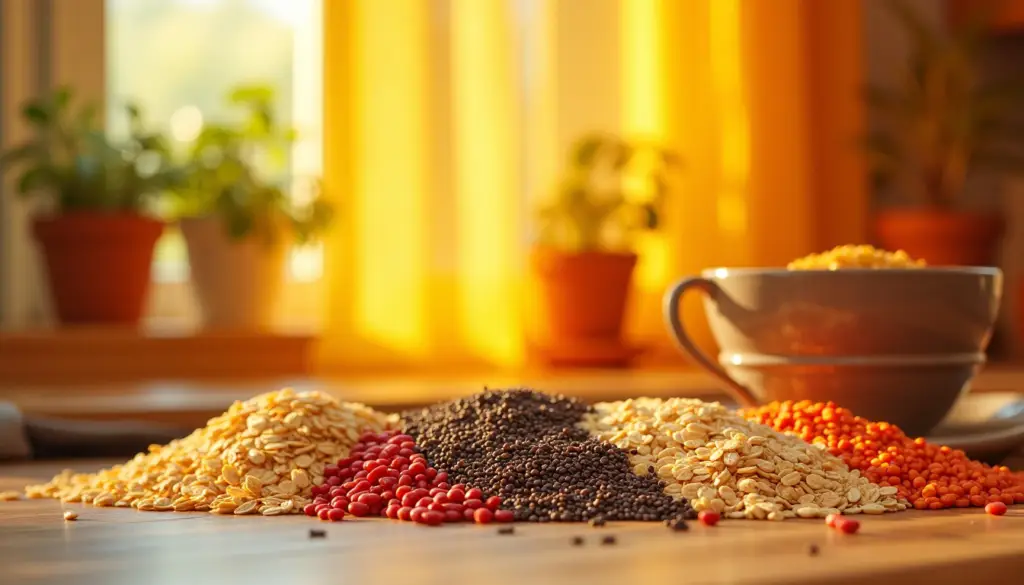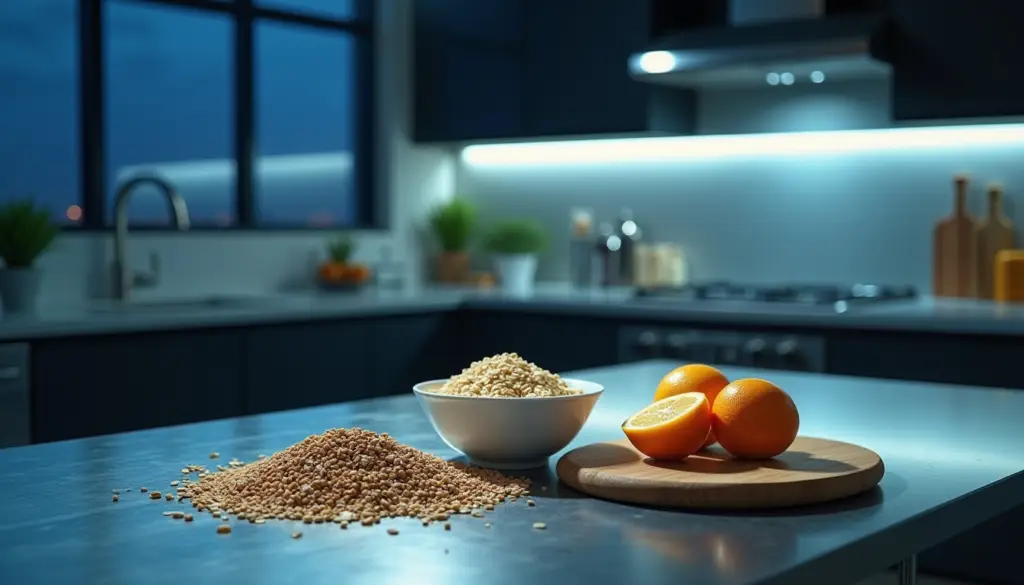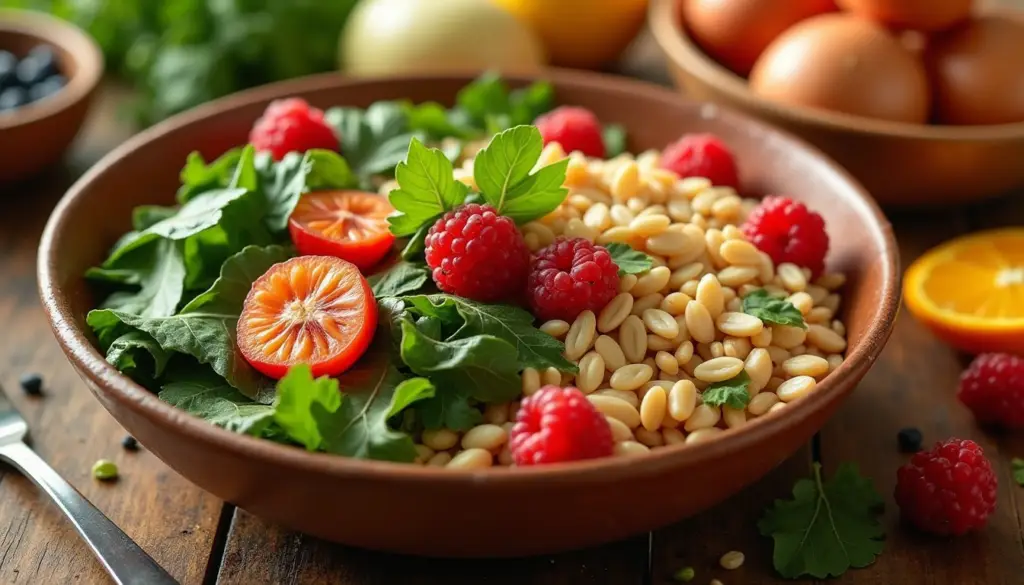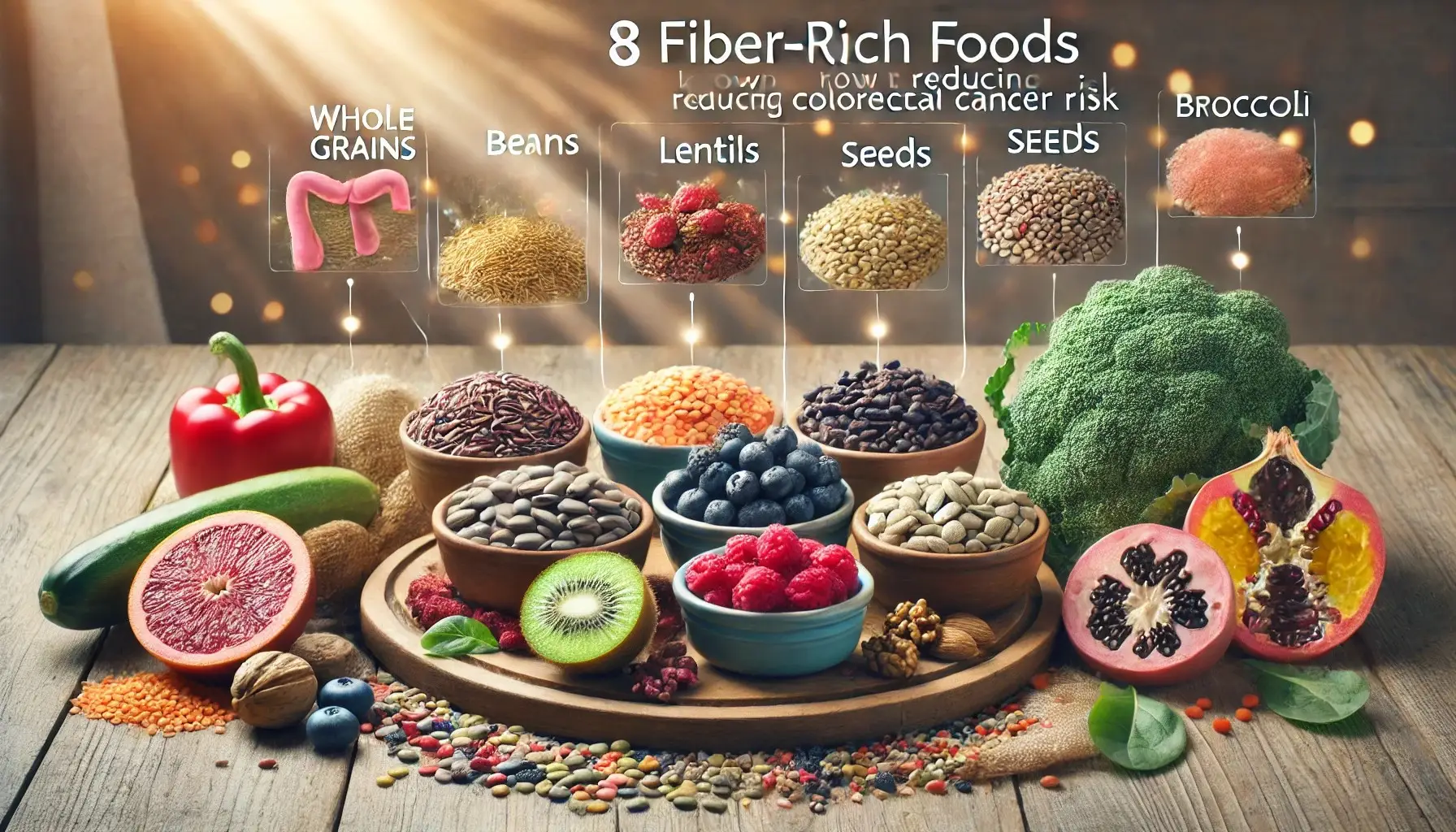Reduce colorectal cancer risk by incorporating these 8 powerful, fiber-rich foods that can help reduce gut health issues and protect against disease.

Table of Contents

Understanding Colorectal Cancer: A Brief Overview
Colorectal cancer, a formidable adversary in the realm of oncology, has become increasingly prevalent in recent years. This malignancy, which affects the colon or rectum, often begins as small, benign clumps of cells called polyps. Over time, these polyps can evolve into cancerous growths, potentially spreading to other parts of the body if left unchecked.
The significance of colorectal cancer lies not only in its prevalence but also in its potential for prevention. Unlike some other forms of cancer, colorectal cancer often develops slowly, providing a window of opportunity for early detection and intervention. Regular screenings, such as colonoscopies, play a crucial role in identifying and removing precancerous polyps before they become malignant.
Understanding the risk factors associated with colorectal cancer is paramount in developing effective prevention strategies. While some factors, such as age and family history, are beyond our control, others are directly influenced by our lifestyle choices. Among these modifiable risk factors, diet stands out as a powerful tool in the fight against colorectal cancer.
To effectively reduce your colorectal cancer risk, it’s important to reduce the intake of processed foods and instead focus on whole, nutrient-dense options.

The Role of Diet in Colorectal Cancer Prevention
The adage “you are what you eat” takes on profound significance when considering the relationship between diet and colorectal cancer risk. Numerous studies have demonstrated that dietary habits can significantly influence the likelihood of developing this disease. The foods we consume can either promote or inhibit the growth of cancerous cells in the colon and rectum.
A diet rich in processed meats, red meat, and high-fat foods has been associated with an increased risk of colorectal cancer. Conversely, a diet abundant in fruits, vegetables, whole grains, and lean proteins has been linked to a reduced risk. This stark contrast underscores the importance of making informed dietary choices to protect your colorectal health.
The protective effects of certain foods against colorectal cancer are attributed to various mechanisms. Some foods contain compounds that directly combat cancer cells, while others support the body’s natural defense systems. Additionally, certain dietary elements promote gut health, creating an environment less conducive to cancer development.

By making conscious efforts to include these foods, you are taking steps to reduce your overall cancer risk.
Fiber-Rich Foods: Your Gut’s Best Friend
Fiber, often hailed as a digestive superhero, plays a crucial role in maintaining colorectal health. This indigestible plant material acts as a natural cleanser for your digestive system, sweeping through the intestines and carrying potential carcinogens along with it. By reducing the time these harmful substances spend in contact with the intestinal walls, fiber helps minimize the risk of cellular damage that could lead to cancer.
Moreover, fiber serves as a prebiotic, nourishing the beneficial bacteria in your gut. These microorganisms play a vital role in maintaining a healthy intestinal environment and supporting your immune system. A thriving gut microbiome has been associated with a reduced risk of colorectal cancer, highlighting the importance of incorporating fiber-rich foods into your diet.
Excellent sources of dietary fiber include:
- Whole grains (oats, quinoa, brown rice)
- Legumes (lentils, chickpeas, black beans)
- Fruits (apples, pears, berries)
- Vegetables (broccoli, carrots, Brussels sprouts)
- Nuts and seeds (almonds, chia seeds, flaxseeds)
Aim to include a variety of these fiber-rich foods in your daily meals to reap their protective benefits against colorectal cancer.
The Power of Cruciferous Vegetables
Cruciferous vegetables, members of the Brassicaceae family, have earned a well-deserved reputation as cancer-fighting powerhouses. These nutrient-dense vegetables contain a unique compound called sulforaphane, which has demonstrated remarkable anti-cancer properties in numerous studies. Sulforaphane works by activating enzymes that detoxify carcinogens and inhibit the growth of cancer cells.
The list of cruciferous vegetables is extensive and includes:
- Broccoli
- Cauliflower
- Brussels sprouts
- Kale
- Cabbage
- Bok choy
- Radishes
- Watercress
To maximize the benefits of these vegetables, it’s recommended to consume them raw or lightly steamed. Overcooking can diminish their nutritional value and reduce the formation of sulforaphane. Incorporating a variety of cruciferous vegetables into your diet can provide a potent defense against colorectal cancer.
Berries: Nature’s Antioxidant Powerhouses
Berries, with their vibrant colors and sweet flavors, offer more than just a delightful taste experience. These small fruits are packed with antioxidants, particularly a class of compounds called anthocyanins. Antioxidants play a crucial role in neutralizing harmful free radicals in the body, which can damage cellular DNA and potentially lead to cancer development.
The antioxidant prowess of berries extends beyond their ability to combat free radicals. Research has shown that berry extracts can inhibit the growth of colon cancer cells and even induce apoptosis (programmed cell death) in these malignant cells. This dual action makes berries a formidable ally in the fight against colorectal cancer.
Some of the most potent berries for cancer prevention include:
- Blueberries
- Strawberries
- Raspberries
- Blackberries
- Goji berries
- Acai berries
Incorporating a variety of berries into your diet can provide a diverse array of antioxidants, enhancing your body’s defense against colorectal cancer. Try adding them to your morning cereal, blending them into smoothies, or enjoying them as a refreshing snack throughout the day.
Fatty Fish: Omega-3s for Colon Health
The benefits of fatty fish extend far beyond heart health, reaching into the realm of cancer prevention. Rich in omega-3 fatty acids, particularly EPA (eicosapentaenoic acid) and DHA (docosahexaenoic acid), fatty fish offer potent anti-inflammatory properties that may help reduce the risk of colorectal cancer.
Inflammation plays a significant role in the development and progression of cancer. Chronic inflammation can damage cellular DNA and create an environment conducive to tumor growth. The omega-3 fatty acids found in fish help combat this inflammation, potentially reducing the risk of colorectal cancer development.
Additionally, these healthy fats may influence gene expression, activating genes that suppress tumor growth and deactivating those that promote it. This epigenetic effect adds another layer to the cancer-fighting potential of fatty fish.
Some excellent sources of omega-3-rich fish include:
- Salmon
- Mackerel
- Sardines
- Herring
- Trout
- Anchovies
Aim to incorporate fatty fish into your diet at least twice a week to harness their protective benefits against colorectal cancer. For those who don’t consume fish, plant-based sources of omega-3s such as flaxseeds, chia seeds, and walnuts can provide similar benefits.
Garlic and Onions: Allium Vegetables for Cancer Prevention
Garlic and onions, members of the allium family, have been revered for their medicinal properties for centuries. Modern research has confirmed their potent cancer-fighting abilities, particularly in relation to colorectal cancer. These pungent vegetables contain organosulfur compounds that have demonstrated impressive anti-cancer effects in numerous studies.
The sulfur compounds in garlic and onions work through multiple mechanisms to combat cancer:
- They inhibit the formation of cancer-causing substances
- Enhance DNA repair
- Induce apoptosis in cancer cells
- Reduce cell proliferation
Furthermore, these compounds support the body’s detoxification processes, helping to eliminate potential carcinogens more efficiently. This multi-faceted approach makes allium vegetables a powerful tool in colorectal cancer prevention.
Other beneficial Allium vegetables include:
- Leeks
- Chives
- Shallots
- Scallions
To maximize the cancer-fighting potential of these vegetables, it’s best to consume them raw or lightly cooked. Crushing or chopping garlic and allowing it to sit for a few minutes before cooking can enhance the formation of its beneficial compounds.
Whole Grains: More Than Just Fiber
While whole grains are often celebrated for their fiber content, their benefits in colorectal cancer prevention extend far beyond this single nutrient. Whole grains are a rich source of various bioactive compounds, including phenolic acids, flavonoids, and lignans, which have demonstrated anti-cancer properties.
These compounds work synergistically to:
- Reduce oxidative stress
- Modulate inflammatory responses
- Influence gene expression related to cancer development
- Support the growth of beneficial gut bacteria
Moreover, whole grains provide essential vitamins and minerals that support overall health and bolster the body’s natural defense systems. The complex carbohydrates in whole grains also help maintain stable blood sugar levels, which is important as high insulin levels have been associated with an increased risk of colorectal cancer.
Incorporate a variety of whole grains into your diet, such as:
- Quinoa
- Brown rice
- Oats
- Barley
- Bulgur
- Whole wheat
- Millet
By replacing refined grains with whole grain alternatives, you can significantly enhance your diet’s cancer-fighting potential and support overall colorectal health.
Leafy Greens: Nutrient-Dense Cancer Fighters
Leafy green vegetables stand out as nutritional powerhouses in the fight against colorectal cancer. Packed with an array of vitamins, minerals, and phytochemicals, these verdant vegetables offer a multifaceted approach to cancer prevention. Their high content of folate, a B vitamin crucial for DNA synthesis and repair, is particularly noteworthy in the context of colorectal health.
Studies have shown that individuals with higher intakes of folate have a lower risk of developing colorectal cancer. This protective effect is attributed to folate’s role in maintaining the integrity of DNA, which is essential in preventing the genetic mutations that can lead to cancer development.
Beyond folate, leafy greens are rich in other cancer-fighting compounds:
- Carotenoids (beta-carotene, lutein, zeaxanthin)
- Flavonoids
- Vitamins C and E
- Minerals such as magnesium and potassium
These nutrients work in concert to combat oxidative stress, reduce inflammation, and support the body’s natural detoxification processes, all of which contribute to a reduced risk of colorectal cancer.
Some of the most potent leafy greens include:
- Spinach
- Kale
- Collard greens
- Swiss chard
- Arugula
- Mustard greens
- Romaine lettuce
Incorporate a variety of these greens into your diet through salads, smoothies, sautés, or as additions to soups and stews. The diverse nutrient profile of leafy greens makes them an indispensable component of a cancer-protective diet.
Beans and Legumes: Protein-Packed Protection
Beans and legumes offer a unique combination of nutrients that make them particularly effective in colorectal cancer prevention. Rich in both soluble and insoluble fiber, these plant-based proteins support digestive health and help maintain a healthy gut environment. The fiber in beans and legumes also aids in the elimination of potential carcinogens from the body, reducing their contact time with the intestinal walls.
In addition to their fiber content, beans and legumes are excellent sources of resistant starch. This type of starch resists digestion in the small intestine and ferments in the colon, producing short-chain fatty acids (SCFAs). SCFAs have been shown to have anti-inflammatory and anti-cancer properties, particularly in the context of colorectal health.
The protein content of beans and legumes is also noteworthy. Plant-based proteins have been associated with a lower risk of colorectal cancer compared to animal proteins, particularly red and processed meats. By substituting beans and legumes for some of the meat in your diet, you can potentially reduce your colorectal cancer risk.
Some excellent choices of beans and legumes include:
- Lentils
- Chickpeas
- Black beans
- Kidney beans
- Navy beans
- Pinto beans
- Soybeans
To incorporate more beans and legumes into your diet, try adding them to soups, salads, and grain bowls, or using them as a base for vegetarian burgers and dips.
Incorporating These Foods into Your Daily Diet
Now that we’ve explored the powerful cancer-fighting properties of these foods, the next step is to seamlessly integrate them into your daily meals. Here are some practical tips to help you increase your intake of these colorectal cancer-fighting foods:
- Start your day with a berry and spinach smoothie, topped with chia seeds for an extra fiber boost.
- Replace refined grains with whole grain alternatives in your sandwiches, pasta dishes, and side dishes.
- Add cruciferous vegetables like broccoli or Brussels sprouts to your stir-fries or roast them as a side dish.
- Incorporate beans or lentils into your soups and salads for added protein and fiber.
- Use garlic and onions as a flavor base for your savory dishes.
- Snack on a handful of berries or nuts between meals.
- Aim to include fatty fish in your meal plan at least twice a week.
- Experiment with new recipes that feature these cancer-fighting foods as main ingredients.
Remember, variety is key. By incorporating a diverse range of these foods into your diet, you’ll ensure a broad spectrum of nutrients and cancer-fighting compounds.
Beyond Diet: Other Lifestyle Factors for Colorectal Cancer Prevention
While diet plays a crucial role in colorectal cancer prevention, it’s important to remember that it’s just one piece of the puzzle. A comprehensive approach to reducing your risk should include other lifestyle factors:
- Regular Exercise: Aim for at least 150 minutes of moderate-intensity exercise or 75 minutes of vigorous-intensity exercise per week. Physical activity has been shown to reduce colorectal cancer risk independently of its effects on body weight.
- Maintain a Healthy Weight: Obesity is a significant risk factor for colorectal cancer. Keeping your weight within a healthy range can significantly reduce your risk.
- Limit Alcohol Consumption: Excessive alcohol intake has been linked to an increased risk of colorectal cancer. If you choose to drink, do so in moderation.
- Quit Smoking: Tobacco use is associated with an increased risk of colorectal cancer, along with many other health issues. If you smoke, consider seeking help to quit.
- Regular Screenings: Follow recommended screening guidelines for colorectal cancer. Early detection through regular screenings can significantly improve outcomes.
- Manage Stress: Chronic stress can negatively impact your overall health and potentially increase cancer risk. Incorporate stress-management techniques such as meditation, yoga, or deep breathing exercises into your routine.
By combining a diet rich in cancer-fighting foods with these lifestyle modifications, you can create a powerful defense against colorectal cancer.
Making these dietary adjustments can help reduce inflammation and support overall health.
Conclusion: Empowering Your Health Through Food Choices
Your plate is the starting point for reducing your colorectal cancer risk. By incorporating the eight powerful foods we’ve discussed—fiber-rich foods, calciferous vegetables, berries, fatty fish, garlic and onions, whole grains, leafy greens, and beans and legumes—you’re taking proactive steps to protect your colorectal health.
Keep in mind, no single food can effectively combat cancer. The key lies in adopting a varied, balanced diet rich in these protective foods, combined with a healthy lifestyle. Every meal is an opportunity to nourish your body and fortify your defenses against colorectal cancer.Take charge of your colorectal health today. Start by incorporating one or two of these cancer-fighting foods into your daily meals this week. Gradually expand your repertoire, experimenting with new recipes and flavors. Your taste buds—and your colon—will thank you. Remember, small, consistent changes can lead to significant health benefits over time. Why not make your next grocery trip a colorectal health-boosting adventure?
By making informed food choices and embracing a healthy lifestyle, you’re not just reducing your colorectal cancer risk—you’re investing in your overall health and well-being. Here’s to empowering your health, one delicious, nutritious meal at a time!
Focusing on these foods can significantly reduce your chances of developing colorectal cancer.
Consider how you can reduce your consumption of unhealthy fats while increasing healthy fats found in fish.
Furthermore, lifestyle choices that help reduce risk factors are just as crucial.
Exercise is another way to help reduce your cancer risk.
Try to reduce the number of fast food meals you consume each week.
Remember that it’s important to reduce your intake of sugar-laden snacks and beverages.
Ultimately, the goal is to reduce your cancer risk by prioritizing wholesome foods.
Incorporate a variety of foods that can help reduce inflammation and promote gut health.
Share this content:

[…] Read also: Reduce Colorectal Cancer Risk: 8 Powerful Foods You Need […]